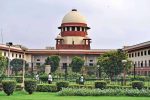Neither a rule of law nor of prudence to the effect that a dying declaration cannot be acted upon without a corroboration -SC

D.D-01.02.2022
Apex court laid down that if there are two dying declarations and the accused is not sought in the first, but the deceased does in the second, the case must be decided on the facts of each case, court must carefully examine all materials and the circumstances surrounding the making of the various dying declarations.
Deceased’s statement – her father-in-law and mother-in-law demanded the money – she refused – assault and poured kerosene over her and with a burning matchstick burnt her – Chargesheet filed – accused denied the charge and pleaded not guilty – prosecution examined 10 witnesses – PW5 turned hostile – brought on record two dying declarations, recorded by the police officer and the Magistrate/SDM – trail court convicted – appeal to High Court – acquitted – aggrieved state preferred appeal.
Appellant state argued on the ground that High Court ought to have relied upon and considered the dying declaration recorded by the competent magistrate also submitted that finding recorded by the learned Trial Court was on appreciation of available evidence on record more particularly the medical evidence.
Respondents/accused opposed the appeal on the ground that High Court rightly observed while acquitting that once the dying declaration was recorded by the police officer on 20.12.2011, thereafter there was no reason to record another dying declaration. Further argued that in the first dying declaration she stated that out of fear of father-in-law, she committed suicide and the role assigned to father-in-law was only of chasing her for beating and not for burning, and in the second dying declaration there was a somersault, and the victim implicated all other family members, the High Court has rightly refused to rely upon the dying declaration recorded by the Magistrate/SDM on 22.12.2011.
Apex court observed that observed that there is no evidence that the Magistrate/SDM was biased or interested in recording the dying declaration against the accused. He was summoned during the investigation and recorded the dying declaration and the deceased’s statement. Even the High Court has not questioned the credibility of the Magistrate/dying SDM’s declaration. Also observed that trial Court correctly noted, if she had committed suicide by pouring kerosene on her chest, she would not have had injuries on her head or backside. We believe that the deceased’s injuries could only have been caused by someone pouring kerosene on her from behind. The High Court has not considered this aspect.
Apex court also laid down there is neither a rule of law nor of prudence to the effect that a dying declaration cannot be acted upon without a corroboration.
Apex court further observed that although the accused was not specifically named by the deceased in her statement under section 161 of the Cr.PC, deceased’s statements all have one thing in common: she was attacked by the accused-respondent. The deceased’s statements in her dying declaration are also consistent with medical evidence that shows burns on all parts of the body except the chest, abdomen, and back.
Appeal allowed – Conviction upheld.
State of U.P.
Versus
Veerpal & Anr.






